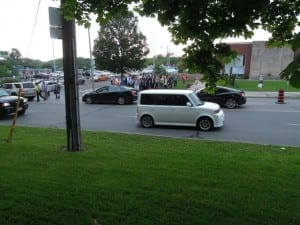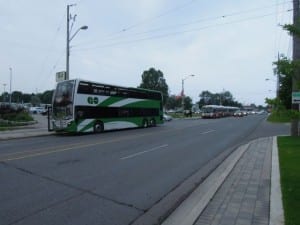Was good to see the GO shuttle buses on July 9, 2013 from Long Branch to Port Credit
The past week we’ve been dealing with the effects of water damage in connection with the weather event of July 8, 2013. Our work is moving along well.
In my case over the years I’ve collected many bits of paper, some of which are important and much of which is good to get rid of.
Water damage occasioned by a sewer back up involves untreated water. The water may be clear water but it’s nonetheless contaminated. It stings your skin. You need to wear protective gloves. Some documents can be dried out but that ones that are not worth saving can just be recycled. Clearing up after the storm offers a good opportunity to focus upon such a recycling process.
In my reading of a wide range of topics, I’ve come across the concept that all things, even inanimate objects, possess a degree of consciousness. This is just a concept. Anyway, it appeals to me. Every item that we possess, in this conceptual framework, is intended to be of service in some way. If it’s left on a shelf, figuratively or literally, an atmosphere of stagnation emerges. Such an atmosphere has an effect on human beings in the presence of stagnation.
This is a concept that I came across years ago when I attended workshops around the late 1970s conducted by David Spangler, Dorothy Maclean, and others connected with the Findhorn community in northern Scotland. Dorothy Maclean has spoken of this, as has David Spangler. In Spangler’s case, he’s spoken of it in a book about the process of manifestation, as the process has come to be talked about by individuals and groups connected with the Findhorn community since the 1970s or thereabouts.
Thus I am pleased that many of the documents and books that have in my case been stored away can now as a result of a weather event be sorted out, recycled where that is necessary, and used when it’s important to use them. When an item is used, as contrasted to being left for a long time on a shelf, it’s making a contribution to the flow of energy in the universe.
I’m a big fan of evidence-based practice. All forms of evidence can be assessed within a symbolic interactionist perspective. Evidence comes in many forms including the forms that Spangler and others are familiar with.
Each of us works with and addresses evidence in the way that creates meaning and that makes sense for each of us.
GO Service shuttle buses
The purpose of my preamble is to share with you how inspired I was to see the GO Service shuttle operation so smoothly at work at the Long Branch GO Station. I believe that was on July 9, 2013, the day after the rain storm. As I understand, that evening the GO trains were not able to travel between Long Branch and Port Credit, and a shuttle bus service was instituted to address this situation.

When commuters arrived at the waiting buses, they knew which buses would be going to which destinations. A police officer was directing traffic to ensure safety. Jaan Pill photo
I took a walk toward the bridge that crosses Etobicoke Creek just west of the Long Branch GO Station. As I walked along the south side of Lake Shore Blvd. West, I observed a fleet of buses along the north side of Lake Shore and a number of officials, at different points, talking on cell phones in preparation for the arrival of the next GO train or series of GO trains from Union Station.
I enjoyed seeing the officials busy with their cell phone communications. I enjoy anything that involves the coordination of information. Project management and coordination, along with communications in any form, are aspects of life that strongly interest me.
Anyway, as I walked along, taking photos with my digital camera, a woman stopped to chat. She said that she had been observing the Long Branch GO Station until 2:00 am the previous night, the night of July 8 when the storm occurred. She had seen commuters walking in the area even at that time in the morning, if I recall correctly. I may not be recalling correctly, but in general that’s what she talked about.
She added (I paraphrase): “It’s wonderful how the people are getting help, so they can get home.” That remark truly stayed with me. I found it very moving. I thought that here is a situation where people need help getting home and the help is available.

View looking south toward Marie Curtis Park from just west of the bridge over Etobicoke Creek at Lake Shore Blvd. West. The bridge is currently undergoing reconstruction. Jaan Pill photo
I’m reminded of the role that water has played in the lives of many of the people that I grew up with. As was the case with many Estonians, members of my extended family escaped across the Baltic Sea travelling to Sweden just before the Soviet forces closed the borders – for the next fifty years, as it turned out – on their return to the Baltic States during the Second World War. Many people tried to cross the Baltic Sea; not all made it; many lives were lost. It was touch and go for our family but in the end it worked out well. In time out own family travelled on to Canada, as was the case with many Estonians in the 1950s.
I can really appreciate when people are helpful. Sometimes people try to be helpful by killing people they do not like or agree with. That kind of helpfulness, which was the premise on which the Soviet system was built upon, is not the kind of helpfulness I have in mind. I refer instead to the helpfulness inherent in what we describe as a democratic, civil society. That is the helpfulness I refer to when I think of the the shuttle buses at the Long Branch GO Station on July 9, 2013.
In recent days we’ve been in touch with and working with The Cooperators insurance company, a restoration company, and City of Toronto staff. We are very pleased that people are getting help. Such help is very much appreciated.
A City of Toronto worker mentioned that it’s helpful if volunteers can help people, such as older residents, who may need help with clearing things out of basements and the like. That is a great concept. Please contact me through this website if you know of a situation in Long Branch where help is needed. I will be pleased to help out with information sharing, and with physical labour, if I’m able to take some time off from the work we are doing at out own home in sorting out what stays, and what can go.


Leave a Reply
Want to join the discussion?Feel free to contribute!